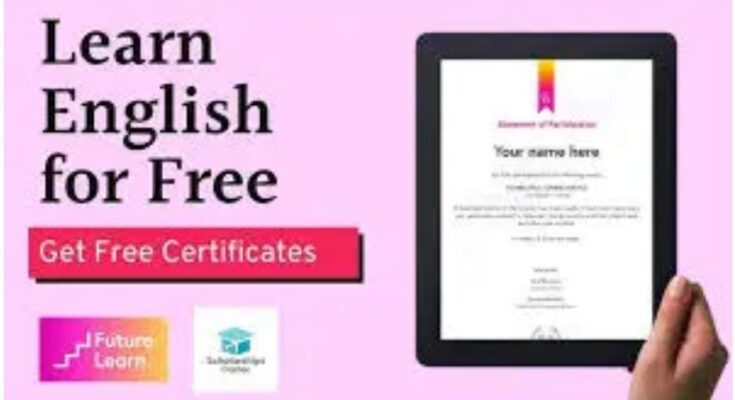In today’s fast-paced world, the ability to communicate effectively in English has become more than just a valuable skill—it’s a necessity. Whether you’re aiming to excel in academics, land a better job, travel confidently, or simply connect with more people globally, learning English can unlock a world of opportunities. Thanks to the advancement of digital learning, enrolling in an English course has never been more accessible. From free mobile apps to structured online certifications, there’s something for everyone. But how do you choose the right English course? What exactly does it offer? Let’s dive into the complete guide.
What is the English Course?
An English Course is a structured program designed to help learners of all levels improve their proficiency in the English language. These courses can range from beginner to advanced and often focus on various aspects such as grammar, vocabulary, pronunciation, writing, reading, listening, and speaking.
English courses are available both online and offline, catering to different learning preferences. Some are self-paced, allowing learners to study anytime, while others follow a fixed schedule with live classes and assessments.
English Course
English courses are no longer limited to classroom environments. Now, you can learn through mobile apps, interactive videos, podcasts, AI tutors, or even gamified learning platforms. Most English courses are designed keeping in mind the Common European Framework of Reference for Languages (CEFR), which helps categorize learning levels from A1 (beginner) to C2 (advanced).
An ideal English course focuses not only on academic fluency but also on practical usage—enabling you to write emails, communicate confidently, attend interviews, and even understand movies and books in English.
Some popular types of English courses include:
-
General English – Overall communication improvement
-
Business English – For corporate communication
-
IELTS/TOEFL Preparation – For academic/professional testing
-
Conversational English – For daily spoken communication
-
Kids’ English Course – Engaging and age-appropriate content for children
Features of English Course [Completely Detailing]
A good English course usually offers the following features:
1. Structured Curriculum
Courses are divided into levels (A1, A2, B1, B2, C1, C2) so learners can join as per their proficiency. Topics include grammar, tenses, idioms, phrasal verbs, and vocabulary-building.
2. Interactive Lessons
Modern English courses use videos, audio clips, animations, and real-life situations to make learning more engaging. Some also include AI-powered chatbots for conversational practice.
3. Quizzes and Assessments
Regular tests, quizzes, and speaking/writing assessments help track progress and identify areas of improvement.
4. Live Classes or AI Tutoring
Premium courses often include access to live sessions with native or fluent English speakers, giving learners a chance to improve pronunciation and comprehension in real time.
5. Certificate of Completion
Upon finishing the course, learners receive a certificate that can enhance their resumes or be used for university or visa applications.
6. Offline Access
Some apps and websites offer downloadable lessons so you can learn even without internet connectivity.
7. Gamified Learning
Apps like Duolingo or ELSA Speak turn learning into a fun experience by using rewards, challenges, and progress tracking.
8. Community Support
Discussion forums, peer review systems, and group activities help you practice with others and gain confidence.
Pros of English Course [Use Table]
| Pros | Description |
|---|---|
| Flexible Learning | Study at your own pace, anywhere, anytime |
| Affordable or Free | Many courses are free or much cheaper than in-person classes |
| Personalized Feedback | Get feedback on your writing, pronunciation, and speaking |
| Certification | Boost your academic or career profile with a verified certificate |
| Access to Native Speakers | Practice with real accents and conversation styles |
| Mobile Learning | Learn on-the-go using your smartphone or tablet |
| Enhanced Confidence | Gradual improvements lead to more confident English usage |
Cons of English Course [Use Table]
| Cons | Description |
|---|---|
| Requires Self-Discipline | Online courses need self-motivation and time management |
| Internet Dependency | Some features like live classes or quizzes need stable internet |
| Not Always Customized | Generic courses may not suit your unique learning style or pace |
| Limited Real-Life Interaction | Online learning can lack real-world practice or immersion |
| Quality Varies Across Platforms | Not all courses are created equally; some may lack proper instruction |
English Course Alternatives [Use Table]
| Alternative | Details |
|---|---|
| YouTube Channels | Free content from English tutors with grammar and vocabulary lessons |
| Language Exchange Apps | Practice with native English speakers in exchange for teaching your language |
| Podcasts for English Learners | Improve listening skills while multitasking or commuting |
| English Learning Books | Grammar and vocabulary books for structured offline learning |
| Private Tutors (Online/Offline) | Personalized 1-on-1 coaching, though often expensive |
| Language Learning Apps | Duolingo, Babbel, Memrise, ELSA Speak – ideal for mobile learning |
| Online Communities | Reddit, Quora, or Facebook groups for language learners |
English Course
English courses are more than just tools for language learning—they’re bridges to better opportunities, self-improvement, and global connectivity. Whether you are preparing for an international exam, applying for a job abroad, or simply want to understand English movies and culture better, the right course can transform your goals into reality.
Before enrolling in any English course, consider your goals:
-
Do you want to improve fluency for travel?
-
Need certification for work?
-
Want to improve business English?
Answering these will help you choose the best course that fits your learning style, budget, and timeline.
open free course



